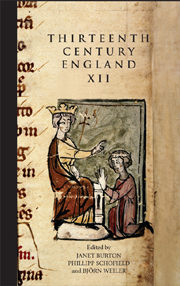Book contents
- Frontmatter
- Contents
- PREFACE
- LIST OF CONTRIBUTORS
- LIST OF ABBREVIATIONS
- The English and the Welsh in Fouke le Fitz Waryn
- Royal Piety in Thirteenth-century Scotland: The Religion and Religiosity of Alexander II (1214–49) and Alexander III (1249–86)
- The 1213 Pipe Roll and Exchequer Authority at the End of John's Reign
- The Public Debate during the Baronial Rebellion
- Richard of Cornwall and the Baronial Opposition in 1263
- Les liens personnels entre les cours de France et d'Angleterre sous le règne de Philippe III, 1270–85
- The Lay Opposition to Edward I in 1297: Its Composition and Character
- Peacekeepers and Lawbreakers in London, 1276–1321
- ‘The peace less kept’? The Origins, Revelations and Impact of Edward I's ‘Trailbaston’ Commissions of 1305–7
- Notes and Documents
Richard of Cornwall and the Baronial Opposition in 1263
Published online by Cambridge University Press: 12 September 2012
- Frontmatter
- Contents
- PREFACE
- LIST OF CONTRIBUTORS
- LIST OF ABBREVIATIONS
- The English and the Welsh in Fouke le Fitz Waryn
- Royal Piety in Thirteenth-century Scotland: The Religion and Religiosity of Alexander II (1214–49) and Alexander III (1249–86)
- The 1213 Pipe Roll and Exchequer Authority at the End of John's Reign
- The Public Debate during the Baronial Rebellion
- Richard of Cornwall and the Baronial Opposition in 1263
- Les liens personnels entre les cours de France et d'Angleterre sous le règne de Philippe III, 1270–85
- The Lay Opposition to Edward I in 1297: Its Composition and Character
- Peacekeepers and Lawbreakers in London, 1276–1321
- ‘The peace less kept’? The Origins, Revelations and Impact of Edward I's ‘Trailbaston’ Commissions of 1305–7
- Notes and Documents
Summary
Around the time of the feast of St Marcus the Evangelist in 1263, Simon de Montfort, the earl of Leicester, returned to England from his self-imposed exile in France. Shortly after his arrival, he began building a broad but fragile coalition against the king, Henry III. This alliance's first appearance can be traced to Oxford, where several long-term reformists and other more recent converts gathered. Having renewed their oaths to the Provisions of Oxford, they demanded in a letter that the king should actively enforce them. Furthermore, they denounced those who opposed the reintroduction of the Provisions as ‘mortal enemies’. Among those whose presence was recorded at this gathering in Oxford was Henry III's younger brother Richard, earl of Cornwall and king of the Romans. Closely identified with the royalist leadership and one of the masterminds behind the king's recovery of power in 1260–1, his inclusion among the confederates was somewhat surprising. Richard's defection was short-lived as, by October 1263, he was firmly back in the royalist camp. Had the earl really deserted his brother during these seven months? If he did follow such an unexpected course, what was the motivation for this brief flirtation with the Montfortian coalition? This paper will begin by examining the nature of the evidence for the alleged desertion. Having established its basis, it will then consider the reasons advanced by both contemporaries and recent historians for the defection before offering a new interpretation of his conduct.
- Type
- Chapter
- Information
- Thirteenth Century England XIIProceedings of the Gregynog Conference, 2007, pp. 61 - 74Publisher: Boydell & BrewerPrint publication year: 2009



